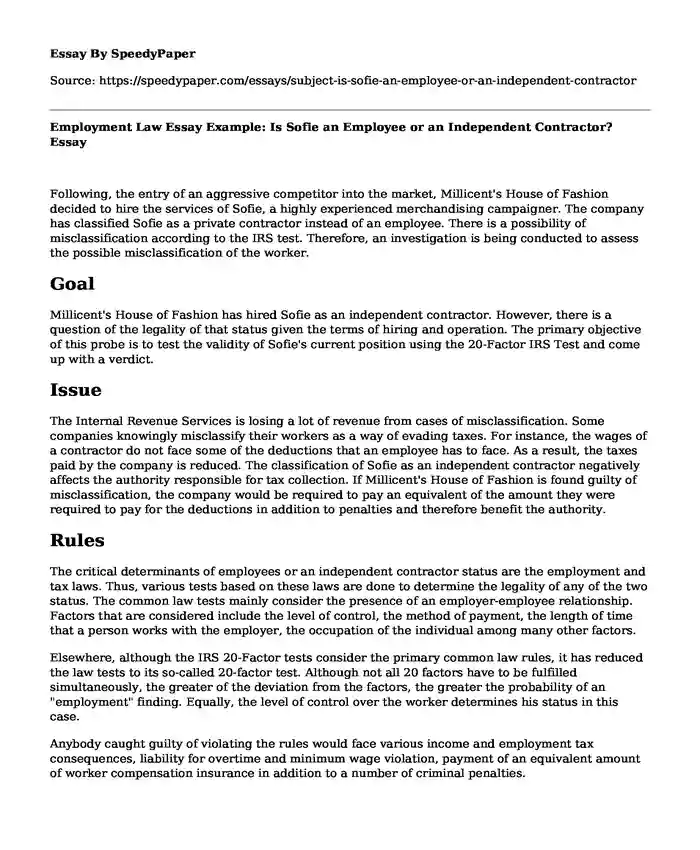
| Type of paper: | Essay |
| Categories: | Employment law |
| Pages: | 3 |
| Wordcount: | 641 words |
Following, the entry of an aggressive competitor into the market, Millicent's House of Fashion decided to hire the services of Sofie, a highly experienced merchandising campaigner. The company has classified Sofie as a private contractor instead of an employee. There is a possibility of misclassification according to the IRS test. Therefore, an investigation is being conducted to assess the possible misclassification of the worker.
Goal
Millicent's House of Fashion has hired Sofie as an independent contractor. However, there is a question of the legality of that status given the terms of hiring and operation. The primary objective of this probe is to test the validity of Sofie's current position using the 20-Factor IRS Test and come up with a verdict.
Issue
The Internal Revenue Services is losing a lot of revenue from cases of misclassification. Some companies knowingly misclassify their workers as a way of evading taxes. For instance, the wages of a contractor do not face some of the deductions that an employee has to face. As a result, the taxes paid by the company is reduced. The classification of Sofie as an independent contractor negatively affects the authority responsible for tax collection. If Millicent's House of Fashion is found guilty of misclassification, the company would be required to pay an equivalent of the amount they were required to pay for the deductions in addition to penalties and therefore benefit the authority.
Rules
The critical determinants of employees or an independent contractor status are the employment and tax laws. Thus, various tests based on these laws are done to determine the legality of any of the two status. The common law tests mainly consider the presence of an employer-employee relationship. Factors that are considered include the level of control, the method of payment, the length of time that a person works with the employer, the occupation of the individual among many other factors.
Elsewhere, although the IRS 20-Factor tests consider the primary common law rules, it has reduced the law tests to its so-called 20-factor test. Although not all 20 factors have to be fulfilled simultaneously, the greater of the deviation from the factors, the greater the probability of an "employment" finding. Equally, the level of control over the worker determines his status in this case.
Anybody caught guilty of violating the rules would face various income and employment tax consequences, liability for overtime and minimum wage violation, payment of an equivalent amount of worker compensation insurance in addition to a number of criminal penalties.
Analysis
Although the Vice President of Merchandising, Elise, gave Sofie the freedom of operation, Sofie had to work under the instruction of Alfonso. She had to report and work within strict timelines with the approval of Alfonso. Additionally, the work of Sofie had to be reviewed weekly through the report that she wrote. She was also limited to the rules of the company. In brief, the operations of Sofie were under strict control of Alfonso.
Conclusion
Contrary to the company's classification, Sofie is not an independent contractor. The terms of hiring do not give her the freedom that an independent contractor should have but instead ties her down to the company's control as per the IRS 20-factor test. The correct classification of her status should be an employee.
Best Practices
- To ensure that the independent contractor status is maintained, the following practices should be adopted:
- Always conduct a self-audit of the independent contractor relationship.
- A central review team that is up-to-date with the misclassification issues should review the contractual arrangements before finalization.
- Revision of the independent contract agreement to ensure that the relationship described fits that of an independent contractor and not employment relationship.
- Exclusion of independent contractors from a company's benefit plans where possible
- Requesting an IRS determination of worker status
- Vigilance regarding misclassification laws and developments in jurisdictions in which one engages contractors
Cite this page
Employment Law Essay Example: Is Sofie an Employee or an Independent Contractor?. (2022, Sep 21). Retrieved from https://speedypaper.net/essays/subject-is-sofie-an-employee-or-an-independent-contractor
Request Removal
If you are the original author of this essay and no longer wish to have it published on the SpeedyPaper website, please click below to request its removal:
- Free Essay on Katherine Dunham's Infusion of Caribbean Dance Style in Her Work
- Small-Scale Qualitative Research Project, Free Paper Sample on Leadership Styles
- Essay Example: Personal Statement for an MBA Admission
- Essay Sample of panel discussion: evaluation with the continued rising cases of climate change
- Best Practice Components of Provider Organizations - Essay Sample
- Free Essay Example: Uses of the Core Curriculum
- Essay Sample on Deceptions and Misleading Concepts of the Film Industries
Popular categories




